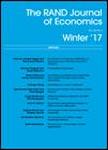-
作者:Chu, Leon Yang; Sappington, David E. M.
作者单位:University of Southern California; State University System of Florida; University of Florida
摘要:We characterize the optimal contract between a principal and a risk-neutral, wealth-constrained agent when an adverse selection problem follows a moral hazard problem. The optimal contract in this setting often is more steeply sloped for the largest output levels than is the optimal contract in either the standard moral hazard setting or the standard adverse selection setting. The large incremental rewards for exceptional performance motivate the agent to deliver substantial effort both before...
-
作者:Streb, Jochen
作者单位:University Hohenheim
摘要:This article examines the determinants of contractual form and renegotiations in the German construction industry during the Third Reich. At the beginning of World War II, firms dealt with growing uncertainty by convincing procurement agencies either to use cost-plus contracts or to include an additional risk premium in fixed-price contracts. In the later years of the war, procurement agencies initiated renegotiations over contract clauses to reduce the extraordinary profits resulting from inf...
-
作者:Prasad, Suraj
作者单位:University of New South Wales Sydney
摘要:I develop an agency model of job assignments where jobs differ based on the breadth of tasks. A tradeoff between task complementarities and relative abilities of workers results in those with balanced skills being assigned to multitask jobs. The same tradeoff between complementarities and relative abilities also influences incentives to sort privately informed workers to jobs. I then draw on a variety of sources (survey data, case studies, and anecdotal evidence) to suggest that relative abili...
-
作者:Chiu, Y. Stephen; Weng, Weiwei
作者单位:University of Hong Kong
摘要:We study a model of centralized admissions in which schools are allowed to pre-commit to admitting qualified applicants who rank them as their top choices over more qualified applicants who do not. A less popular school may use the pre-commitment to steal applicants who otherwise would not choose it as their top choice (the stealing motive); a popular school may use the pre-commitment to prevent its own applicants from being stolen (the preemptive motive). We identify the conditions for these ...


